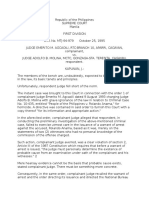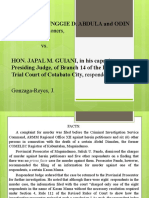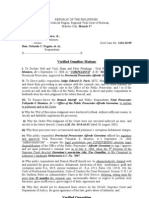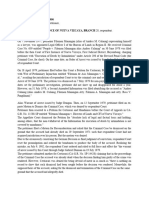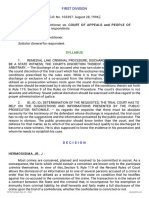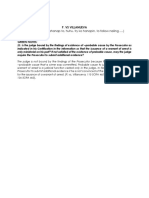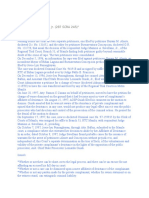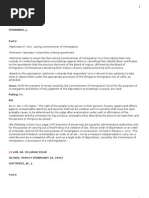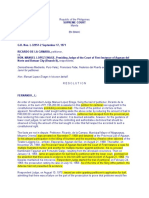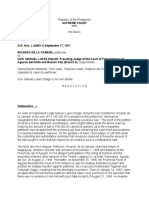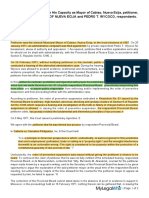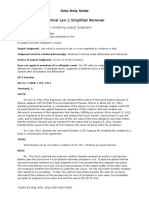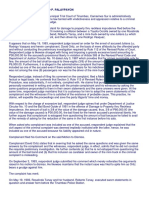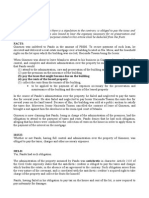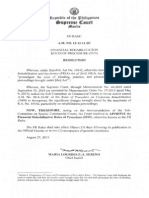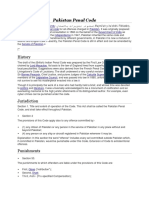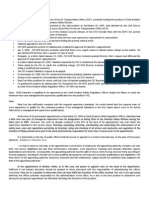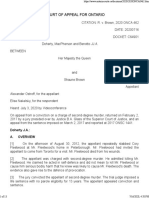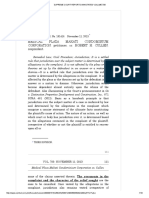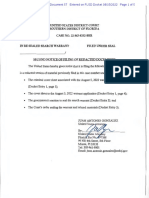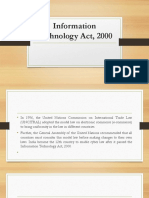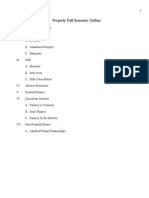Agcaoili v. Molina
Agcaoili v. Molina
Uploaded by
Mariel QuinesCopyright:
Available Formats
Agcaoili v. Molina
Agcaoili v. Molina
Uploaded by
Mariel QuinesOriginal Description:
Copyright
Available Formats
Share this document
Did you find this document useful?
Is this content inappropriate?
Copyright:
Available Formats
Agcaoili v. Molina
Agcaoili v. Molina
Uploaded by
Mariel QuinesCopyright:
Available Formats
1/31/2015
SUPREMECOURTREPORTSANNOTATEDVOLUME249
482
SUPREME COURT REPORTS ANNOTATED
Agcaoili vs. Molina
*
A.M. No. MTJ94979. October 25, 1995.
JUDGE EMERITO M. AGCAOILI, RTCBRANCH 10,
APARRI, CAGAYAN, complainant, vs. JUDGE ADOLFO
B. MOLINA, MCTC, GONZAGASTA. TERESITA,
CAGAYAN, respondent.
Judges Warrants of Arrest Preliminary Investigation A
warrant of arrest shall be issued only when the municipal trial
judge conducting the preliminary investigation is satisfied, after
an examination in
_________________
11
Dalmacio Celino v. Judge Zeus C. Abrogar, A.M. No. RTJ951317, June 27,
1995.
*
FIRST DIVISION.
483
VOL. 249, OCTOBER 25, 1995
483
Agcaoili vs. Molina
writing in the form of searching questions and answers, that a
probable cause exists and that there is a necessity of placing the
respondent under immediate custody in order not to frustrate the
ends of justice.Section 6(b), Rule 112 of the New Rules of
Criminal Procedure requires that a warrant of arrest shall be
issued only when the municipal trial judge conducting the
preliminary investigation is satisfied after an examination in
http://www.central.com.ph/sfsreader/session/0000014b409fa560d83d51d4000a0082004500cc/p/ALC853/?username=Guest
1/12
1/31/2015
SUPREMECOURTREPORTSANNOTATEDVOLUME249
writing in the form of searching questions and answers, that a
probable cause exists and that there is a necessity of placing the
respondent under immediate custody in order not to frustrate the
ends of justice. This is in conformity with the constitutional
mandate that no warrant of arrest shall issue except upon
probable cause to be determined personally by the judge after
examination under oath or affirmation of the complainant and the
witnesses he may produce.
Same Same Same Same Probable Cause Words and
Phrases Probable Cause, Defined.In turn, probable cause for
the issuance of a warrant of arrest has been defined as such facts
and circumstances which would lead a reasonably discreet and
prudent man to believe that an offense has been committed by the
person sought to be arrested.
Same Same Same Same Same Evidence Hearsay evidence
cannot be the basis of probable cause.Although the foregoing
provisions seemingly grant judges wide latitude and unbridled
discretion in determining probable cause, an elementary legal
principle must not be compromisedhearsay evidence cannot be
the basis of probable cause. The rules on evidence are explicit. A
witness can testify only to those facts which he knows of his
personal knowledge that is, which are derived from his own
perception. Hearsay evidence, therefore, has no probative value
whatsoever. Yet, in the case at bench, respondent judge found
probable cause and even issued an arrest warrant on the basis of
the testimonies of Mencelacion Padamada and Rosita Castillo
which were obviously hearsay.
Same Same Same Same Same The determination of
probable cause is a function of the judge and is not for the
provincial fiscal or prosecutor to ascertain.Respondent cannot
pass the blame and burden to the provincial prosecutor. The
determination of probable cause is a function of the judge and is
not for the provincial fiscal or prosecutor to ascertain. Only the
judge and the judge alone makes this determination.
Same Constitutional Law Bill of Rights Liberty, in any part
of the world is a basic human right, the curtailment of which must
be in strict conformity with the procedure laid down by law.
Liberty, in any
484
484
SUPREME COURT REPORTS ANNOTATED
http://www.central.com.ph/sfsreader/session/0000014b409fa560d83d51d4000a0082004500cc/p/ALC853/?username=Guest
2/12
1/31/2015
SUPREMECOURTREPORTSANNOTATEDVOLUME249
Agcaoili vs. Molina
part of the world is a basic human right, the curtailment of which
must be in strict conformity with the procedure laid down by law.
It is, therefore, this constant reminder which compels us to
remain ever vigilant.
ADMINISTRATIVE MATTER in the Supreme Court.
Grave Ignorance of the Law.
The facts are stated in the opinion of the Court.
KAPUNAN, J.:
The members of the bench are, undoubtedly, expected to be
knowledgeable in the law, its basic tenets and principles.
Unfortunately, respondent judge fell short of the norm.
The instant 1case was brought to this Court in connection
with the order of complainant Judge Emerito M. Agcaoili
dated 9 August 1993 charging Judge Adolfo B. Molina with
grave ignorance of the law in relation to Criminal Case No.
10435, entitled People of the Philippines v. Rolando
Anama, for homicide. A directive was contained in said
order to furnish this Court with a copy thereof for its
information and appropriate action.
In the aforecited order, complainant judge alleged that
respondent, in conducting the preliminary investigation of
the abovementioned criminal case, failed to exercise
utmost care in the issuance of a warrant of arrest against
the accused, Rolando Anama, based as it was, merely on
the statements of two (2) witnesses who had personal
knowledge of the commission of the offense charged.
Such action, complainant judge averred, was a clear
violation of section 2, Article III of the 1987 Constitution
which requires that before a warrant of arrest is issued,
the judge must personally determine the existence of
probable cause from an examination
under oath of the
2
complainant and his witnesses.
Mere hearsay evidence cannot be the basis that probable
cause exists, stated complainant judge. There must be
something more concrete.
_______________
1
Rollo, pp. 23.
http://www.central.com.ph/sfsreader/session/0000014b409fa560d83d51d4000a0082004500cc/p/ALC853/?username=Guest
3/12
1/31/2015
SUPREMECOURTREPORTSANNOTATEDVOLUME249
2
Ibid.
485
VOL. 249, OCTOBER 25, 1995
485
Agcaoili vs. Molina
Consequently, in the same order, complainant judge
recalled the warrant of arrest and the order directing its
issuance and directed the National Bureau of
Investigation, through Regional Office No. 2, Ilagan,
Isabela, to conduct an investigation in order to avoid a
possible miscarriage of justice.
In his Comment, respondent admitted that he was the
inquest judge in the preliminary investigation of the above
entitled case and finding the existence of probable cause,
he ordered the issuance of the warrant of arrest against the
accused and as the case was cognizable by the Regional
Trial Court, it was forwarded
to the Provincial Prosecutors
3
Office in Aparri, Cagayan.
Respondent explained that since the case was cognizable
by the Regional Trial Court, the Provincial Prosecutors
Office, which has the final say and disposition on the
existence of probable cause on cases cognizable by the
Regional Trial Court, should carry the brunt of 4 the
responsibility for erroneous finding of probable cause.
Respondent judge argued that the findings of
complainant judge in his 9 August 1993 order is his
opinionargument and contended that the proper remedy
for a seemingly
weak probable cause finding is a
5
reinvestigation.
On 17 November 1993, Judge Antonino A. Aquilizan,
Acting Presiding Judge of the Regional Trial Court of
Cagayan, Branch 10 denied with finality the motion filed
by Assistant Provincial Prosecutor Melencio Unciano for
reconsideration of the 9 August 1993 order of then
Presiding Judge Emerito M. Agcaoili and dismissed the
aforestated criminal case provisionally on 6 grounds of
absence of probable cause against the accused.
In its report and evaluation dated 26 April 1995, the
Office of the Court Administrator recommended that
respondent be admonished to be more careful in the
determination of the existence of probable cause before
issuing a warrant of arrest. Thus,
http://www.central.com.ph/sfsreader/session/0000014b409fa560d83d51d4000a0082004500cc/p/ALC853/?username=Guest
4/12
1/31/2015
SUPREMECOURTREPORTSANNOTATEDVOLUME249
________________
3
Memorandum of the Office of the Court Administrator, 26 April 1995.
Ibid. Rollo, p. 17.
Ibid.
Status Report on Criminal Case No. 10435 entitled People v.
Rolando Anama, p. 3.
486
486
SUPREME COURT REPORTS ANNOTATED
Agcaoili vs. Molina
opined the Office of the Court Administrator:
Close perusal of the records disclosed that the complaining
witnesses do not have personal knowledge of the facts which
became the basis of the filing of the crime charged and of the
issuance of the warrant of arrest. From the affidavits of the
affiants alone (Rollo, pp. 67), it is very clear that they learned the
killing of victim Virgilio Capa from a certain Wilma Anama.
Respondent Judge, however, on the basis of the said affidavits,
issued an Order dated October 8, 1992 directing the issuance of a
warrant of arrest for the temporary confinement of the accused.
Thereafter, the warrant of arrest was issued on the same day.
Respondent Judge in issuing the warrant of arrest failed to
observe the elementary requirement that the complainant and his
witnesses should have personal knowledge of the commission of
the offense charged. Just like in the issuance of search warrants,
mere hearsay evidence, cannot, standing alone, justify the
issuance of a warrant of arrest (See Quintero vs. National Bureau
of Investigation, G.R. No. 35149, June 23, 1988, Padilla, J.).
Respondent Judge should be reminded that under Section 36,
Rule 130, Revised Rules on Evidence, A witness can testify only
to those facts which he knows of his personal knowledge that is,
which are derived from his own perception, x x x (309).
We concur with the findings of the Office of the Court
Administrator.
Section 6(b), Rule 112 of the New Rules of Criminal
Procedure requires that a warrant of arrest shall be issued
only when the municipal trial judge conducting the
preliminary investigation is satisfied after an examination
in writing in the form of searching questions and answers,
that a probable cause exists and that there is a necessity of
http://www.central.com.ph/sfsreader/session/0000014b409fa560d83d51d4000a0082004500cc/p/ALC853/?username=Guest
5/12
1/31/2015
SUPREMECOURTREPORTSANNOTATEDVOLUME249
placing the respondent under immediate custody in order
not to frustrate the ends of justice. This is in conformity
with the constitutional mandate that no warrant of arrest
shall issue except upon probable cause to be determined
personally by the judge after examination under oath or
affirmation
of the complainant and the witnesses he may
7
produce.
_______________
7
Section 2, Article III, The 1987 Constitution of the Republic of the
Philippines.
487
VOL. 249, OCTOBER 25, 1995
487
Agcaoili vs. Molina
In turn, probable cause for the issuance of a warrant of
arrest has been defined as such facts and circumstances
which would lead a reasonably discreet and prudent man to
believe that an offense
has been committed by the person
8
sought to be arrested.
Although the foregoing provisions seemingly grant
judges wide latitude and unbridled discretion in
determining probable cause, an elementary legal principle
must not be compromisedhearsay evidence cannot be the
basis of probable cause. The rules on evidence are explicit.
A witness can testify only to those facts which he knows of
his personal knowledge
that is, which are derived from his
9
own perception. Hearsay 10evidence, therefore, has no
probative value whatsoever. Yet, in the case at bench,
respondent judge found probable cause and even issued an
arrest warrant on the basis of the testimonies of
Mencelacion Padamada and Rosita Castillo which were
obviously hearsay. Consider the preliminary investigation
conducted by respondent judge:
xxx
Q You said that you are Mencelacion Padamada, is this
Mencelacion Padamada the same as Mencelacion
Castillo Capa?
A Yes, sir.
Q Do you know Virgilio Capa?
http://www.central.com.ph/sfsreader/session/0000014b409fa560d83d51d4000a0082004500cc/p/ALC853/?username=Guest
6/12
1/31/2015
SUPREMECOURTREPORTSANNOTATEDVOLUME249
A Yes, sir.
Q Why do you know him?
A He is my son.
Q You said you are Mrs. Padamada, how come that the
family name of your son is Capa?
A He is my child in my first nuptial.
Q Was your first husband still alive?
A He died already.
Q Are you legally married with your husband?
A No, sir, he is only common law husband.
_______________
8
Allado v. Diokno, 232 SCRA 192 (1994) See also Webb v. De Leon, et
al., G.R. No. 121234 Gatchalian v. De Leon, et al., G.R. No. 121245
Lejano v. De Leon, et al., G.R. No. 121297, 23 August 1995.
9
See Sec. 36, Rule 130, Revised Rules on Evidence.
10
Eugenio v. CA, 239 SCRA 207 (1994) Ancog v. Tan, 227 SCRA 137
(1993).
488
488
SUPREME COURT REPORTS ANNOTATED
Agcaoili vs. Molina
Q You said that Virgilio Capa is your son, do you know
where is your son now?
A He was already dead and buried at the cemetery of Sta.
Ana, Cagayan.
Q Do you know the cause of his death?
A Yes, sir, they killed him.
Q You said that they killed him do you know the person
who killed him?
A I do not know his name but his sister came to me and
reported the incident.
Q Will you please tell the name of the person who killed
your son Virgilio Capa?
A Rolando Anama.
Q How did Rolando Anama, killed your son, if you know?
http://www.central.com.ph/sfsreader/session/0000014b409fa560d83d51d4000a0082004500cc/p/ALC853/?username=Guest
7/12
1/31/2015
SUPREMECOURTREPORTSANNOTATEDVOLUME249
A They stabbed him to death.
Q What kind of weapon did he use in killing your son?
A I do not know sir, all I know he was killed by Rolando
Anama.
Q So is the court made to understand that you were not
present during the killing of your son, isnt it?
A Yes, sir, I was not present because I was at home.
Q So it is understood that you were only informed about
the death of your son?
A Yes, sir, because his sister Wilma Anama, came to me
and reported the incident regarding the death of my son
Virgilio Capa.
Q What is the name of his sister?
A Wilma Anama.
Q What did you do when Wilma Anama came to your
house and reported the killing incident of your son
Virgilio Capa?
A We went to see.
Q What did you do at that time when you were informed
about the killing of your son?
A I went to see and verify it.
Q Where?
A At San Vicente, Sta. Ana, Cagayan, to the house of
Rolando Anama.
Q What did you find out when you reach the house of
Rolando Anama?
A I found out that my son, is already buried.
Q How did you come to know that your son was buried?
A Wilma Anama reported to me sir.
COURT: That is all. (Italics ours)
xxx
489
VOL. 249, OCTOBER 25, 1995
489
Agcaoili vs. Molina
Q Please state your name and other personal
http://www.central.com.ph/sfsreader/session/0000014b409fa560d83d51d4000a0082004500cc/p/ALC853/?username=Guest
8/12
1/31/2015
SUPREMECOURTREPORTSANNOTATEDVOLUME249
circumstances?
A Rosita Castillo, 52 years old, married, housekeeper and
resident of ParadaBatu, Sta. Ana, Cagayan.
COURT:
Q On June 15, 1992 in the morning, can you still recall
where were you?
A I was in our house sir.
Q While you were inside your house can you recall some
(newsbits) that reached you?
A Yes, sir.
Q What was that news items that reached you?
A Wilma Anama told me that Virgilio Capa was killed by
Rogelio Anama.
Q Who is this Wilma Anama how is she related to the
accused?
A They are brother and sister.
Q When Wilma Anama related to you that Virgilio Capa
was killed by Rolando Anama, what did you do?
A I informed the mother of Virgilio Capa.
Q Who is the mother of Virgilio Capa?
A Mencelacion Capa.
Q When you informed the mother of Virgilio Capa was
killed by Rolando Anama, what did you do?
A I informed the mother of Virgilio Capa.
Q Who is the mother of Virgilio Capa?
A Mencelacion Capa.
Q When you informed the mother of Virgilio Capa about
the killing incident of her son what did you do if there
be any?
A I informed Mencelacion Padamada, about the killing of
her son and further instructed her to go and see her son.
Q Is the court made to understand that you were not
present during the killing incident happened?
A No, sir.
Q And you do not know the day when Rogelio Anama
killed Virgilio Capa isnt it?
A Yes, sir.
http://www.central.com.ph/sfsreader/session/0000014b409fa560d83d51d4000a0082004500cc/p/ALC853/?username=Guest
9/12
1/31/2015
SUPREMECOURTREPORTSANNOTATEDVOLUME249
Q You were only informed by Wilma Anama the sister of
the herein accused about the killing of Virgilio Capa isnt
it?
A Yes, sir.
Q Aside from that report made by Wilma Anama what else
did Wilma Anama tell you if there be any?
A No more sir, those were only the things told to me by
Wilma Anama, but she even revealed that Virgilio Capa,
was
490
490
SUPREME COURT REPORTS ANNOTATED
Agcaoili vs. Molina
buried by her brother Rogelio Anama after killing him.
Q Did he tell the place where he was buried?
A Yes, sir.
Q To whom did Wilma Anama reveal that Virgilio Capa
was buried after he was killed by Rolando Anama?
A I, sir.
Q How about the mother of Virgilio Capa was she present
at that time when Wilma Anama reported the incident
to you?
A The mother was not present.
Q So it was you to whom Wilma Anama related the killing
of Virgilio Capa by Rolando Anama?
11
A Yes, sir. (Italics ours).
xxx
We are as perplexed as complainant judge Agcaoili why
Wilma Anama, who apparently witnessed the alleged crime
or has personal knowledge thereof, was not summoned by
respondent for investigation. She could have been the key
to determining whether or not Rolando Anama was the
probable perpetrator of the grisly killing.
Respondent cannot pass the blame and burden to the
provincial prosecutor. The determination of probable cause
is a function of the judge and is not for the provincial fiscal
or prosecutor to ascertain. Only the judge and the judge
http://www.central.com.ph/sfsreader/session/0000014b409fa560d83d51d4000a0082004500cc/p/ALC853/?username=Guest
10/12
1/31/2015
SUPREMECOURTREPORTSANNOTATEDVOLUME249
12
alone makes this determination.
Liberty, in any part of the civilized world is a basic
human right, the curtailment of which must be in strict
conformity with the procedure laid down by law. It is,
therefore, this constant reminder which compels us to
remain ever vigilant.
WHEREFORE,
respondent
judge
is
hereby
REPRIMANDED for his failure to comply with the
pertinent rules on the issuance of a warrant of arrest, with
a warning that repetition of the same or similar acts will be
dealt with more severely. Let a copy of this resolution be
entered in his record.
________________
11
TSN, 8 October 1992, pp. 25.
12
Allado v. Diokno (supra) Lim, Sr. v. Felix, 194 SCRA 292 (1991)
Circular No. 12 Guidelines on Issuance of Warrants of Arrests under
Section 2, Art. III, 1987 Constitution, 30 June 1987.
491
VOL. 249, OCTOBER 25, 1995
491
Agcaoili vs. Molina
SO ORDERED.
Padilla (Chairman), Davide, Jr., Bellosillo and
Hermosisima, Jr., JJ., concur.
Respondent Judge Adolfo B. Molina reprimanded and
warned against repetition of similar act, for nonobservance
of rules on issuance of warrant of arrest.
Notes.An extensive warrantless search of a vehicle
that has been stopped is constitutionally permissible only if
there is probable cause. (People vs. Barros, 231 SCRA 557
[1994])
It is patent error for the judge to base his order granting
bail merely on the supporting affidavits attached to the
information since those are merely intended to establish
probable cause as basis for the issuance of an arrest
warrant and not to control his discretion to deny or grant
bail in all situations. (Aurillo, Jr. vs. Francisco, 235 SCRA
283 [1994])
http://www.central.com.ph/sfsreader/session/0000014b409fa560d83d51d4000a0082004500cc/p/ALC853/?username=Guest
11/12
1/31/2015
SUPREMECOURTREPORTSANNOTATEDVOLUME249
o0o
492
Copyright2015CentralBookSupply,Inc.Allrightsreserved.
http://www.central.com.ph/sfsreader/session/0000014b409fa560d83d51d4000a0082004500cc/p/ALC853/?username=Guest
12/12
You might also like
- Statutory ConstructionDocument8 pagesStatutory ConstructionDwight Lo100% (3)
- Kenneth Walker Complaint FilingDocument38 pagesKenneth Walker Complaint FilingDebbie Harbsmeier100% (1)
- Law of The Sea AssignmentDocument27 pagesLaw of The Sea AssignmentAnnie Mampilly86% (7)
- Agcaoili V Molina DigestedDocument7 pagesAgcaoili V Molina DigestedVhinj CostillasNo ratings yet
- 8 Tambunting - v. - Court - of - AppealsDocument12 pages8 Tambunting - v. - Court - of - AppealsKobe Lawrence VeneracionNo ratings yet
- Agcaoili Versus MolinaDocument9 pagesAgcaoili Versus MolinaAnskee TejamNo ratings yet
- Cases For Legal Ethics Canon 14-22Document68 pagesCases For Legal Ethics Canon 14-22Christine Joy EstropiaNo ratings yet
- Search and Sezure CasesDocument15 pagesSearch and Sezure CasesDon YcayNo ratings yet
- Mayor Bai Unggie D. Abdula and Odin ABDULA, PetitionersDocument10 pagesMayor Bai Unggie D. Abdula and Odin ABDULA, PetitionerssejboyNo ratings yet
- Agcaoili v. MolinaDocument1 pageAgcaoili v. MolinaMara ClaraNo ratings yet
- Verified Omnibus MotionsDocument15 pagesVerified Omnibus MotionsJudge Florentino Floro100% (1)
- Section 13 14 AssignmentDocument115 pagesSection 13 14 AssignmentabethzkyyyyNo ratings yet
- Ortiz Vs Palaypayon 234 Scra 391Document4 pagesOrtiz Vs Palaypayon 234 Scra 391Tashi MarieNo ratings yet
- VOL. 154, SEPTEMBER 30, 1987 567: Uy vs. MercadoDocument5 pagesVOL. 154, SEPTEMBER 30, 1987 567: Uy vs. MercadoAngelie FloresNo ratings yet
- Lim v. Judge DumlaoDocument5 pagesLim v. Judge Dumlaolagrosas.jp067No ratings yet
- Dela Camara V EnageDocument4 pagesDela Camara V EnageJan-Lawrence OlacoNo ratings yet
- Pangandaman v. CasarDocument8 pagesPangandaman v. CasarJohn Soap Reznov MacTavishNo ratings yet
- MANANGAN vs. CFI Nueva VizcayaDocument3 pagesMANANGAN vs. CFI Nueva VizcayaHechelle S. DE LA CRUZNo ratings yet
- 6 Chua v. Court of AppealsDocument10 pages6 Chua v. Court of AppealsJoshua Daniel BelmonteNo ratings yet
- Allado V Diokno 1994 DigestDocument4 pagesAllado V Diokno 1994 Digestviva_33No ratings yet
- Alonte Vs SavellanoDocument17 pagesAlonte Vs SavellanoOlek Dela Cruz100% (1)
- Chapter 4 D (19-25)Document13 pagesChapter 4 D (19-25)Gretchen Dominguez-ZaldivarNo ratings yet
- Crim Pro Digest 1Document4 pagesCrim Pro Digest 1GilbertGalopeNo ratings yet
- People Vs RioDocument9 pagesPeople Vs RiomanilatabajondaNo ratings yet
- Cojuangco, Jr. vs. Sandiganbayan, 300 SCRA 367, G.R. No. 134307 December 21, 1998 - DIGESTDocument4 pagesCojuangco, Jr. vs. Sandiganbayan, 300 SCRA 367, G.R. No. 134307 December 21, 1998 - DIGESTLester Agoncillo100% (1)
- Digest of Cases in Criminal ProcedureDocument6 pagesDigest of Cases in Criminal ProcedureMary Flor GuzmanNo ratings yet
- Nota-Nota Notes Criminal Law 2 Simplified Reviewer: Article 204: Knowingly Rendering Unjust JudgmentDocument57 pagesNota-Nota Notes Criminal Law 2 Simplified Reviewer: Article 204: Knowingly Rendering Unjust JudgmentWILLY C. DUMPITNo ratings yet
- Searches and Seizures CasesDocument36 pagesSearches and Seizures CasesHanna MapandiNo ratings yet
- De La Camara Vs EnageDocument4 pagesDe La Camara Vs EnageGenevieve BermudoNo ratings yet
- RICARDO DE LA CAMARA Vs EnageDocument3 pagesRICARDO DE LA CAMARA Vs EnageM Azeneth JJNo ratings yet
- BASCO vs. RAPATALODocument21 pagesBASCO vs. RAPATALOasezalardeNo ratings yet
- Probation - Decided CasesDocument31 pagesProbation - Decided Casesalbert limNo ratings yet
- Dela Camara Vs Enage Republic of The PhilippinesDocument4 pagesDela Camara Vs Enage Republic of The PhilippinesMeryl FernandezNo ratings yet
- Case Digest From PI CrimproDocument43 pagesCase Digest From PI CrimproNichol GamingNo ratings yet
- UntitledDocument3 pagesUntitledStephen Neil Casta�oNo ratings yet
- Crespo vs. Provincial Board, 16 SCRA 66 (1988)Document2 pagesCrespo vs. Provincial Board, 16 SCRA 66 (1988)Angel HandaNo ratings yet
- Crim 2 Reviewer - NotesDocument58 pagesCrim 2 Reviewer - NotesWILLY C. DUMPITNo ratings yet
- Concerned Citizens v. Judge ElmaDocument5 pagesConcerned Citizens v. Judge ElmaAndotNo ratings yet
- 01 People - v. - Pagal20210428-12-4d424tDocument54 pages01 People - v. - Pagal20210428-12-4d424tJakie CruzNo ratings yet
- Arraignment OriginalsDocument16 pagesArraignment OriginalsMaisie ZabalaNo ratings yet
- Supreme CourtDocument22 pagesSupreme CourtMikko AcubaNo ratings yet
- Dolalas Vs OmbudsmanDocument2 pagesDolalas Vs OmbudsmanDelia PeabodyNo ratings yet
- Constitutional Law - Searches and Seizures Full CasesDocument32 pagesConstitutional Law - Searches and Seizures Full CasesSharmaine Alisa BasinangNo ratings yet
- Cabatingan v. Arcueno A.M. No. MTJ-00-1323 August 22, 2002Document4 pagesCabatingan v. Arcueno A.M. No. MTJ-00-1323 August 22, 2002karlamaedpNo ratings yet
- Supreme Court: The Solicitor General For Plaintiff-Appellee. Ramon A. Gonzales For Defendant-AppellantDocument23 pagesSupreme Court: The Solicitor General For Plaintiff-Appellee. Ramon A. Gonzales For Defendant-Appellantpoint clickNo ratings yet
- 1977 Borja - v. - Mendoza20190106 5466 cmksv0Document4 pages1977 Borja - v. - Mendoza20190106 5466 cmksv0OldAccountof Ed ThereseNo ratings yet
- Evidence Page 1Document110 pagesEvidence Page 1Raz Uy BucatcatNo ratings yet
- 126033-1996-Roberts Jr. v. Court of AppealsDocument39 pages126033-1996-Roberts Jr. v. Court of AppealsIAN ANGELO BUTASLACNo ratings yet
- In Re ClimacoDocument10 pagesIn Re ClimacoFranz Raymond Javier AquinoNo ratings yet
- PEOPLE Vs CaloDocument2 pagesPEOPLE Vs CaloErmeline TampusNo ratings yet
- People v. Court of AppealsDocument2 pagesPeople v. Court of AppealsViner Hernan SantosNo ratings yet
- People vs. Valeriano (G.R. Nos. 103604 - 05, September 23, 1993)Document17 pagesPeople vs. Valeriano (G.R. Nos. 103604 - 05, September 23, 1993)AndresNo ratings yet
- Roberts, Jr. V CA, G.R. No. 113930, Mar 5, 1996Document3 pagesRoberts, Jr. V CA, G.R. No. 113930, Mar 5, 1996Sarah Jane-Shae O. Semblante100% (1)
- Rule 112 CasesDocument74 pagesRule 112 CasesRolando Mauring ReubalNo ratings yet
- 14-People v. Rio G.R. No. 90294 September 24, 1991Document7 pages14-People v. Rio G.R. No. 90294 September 24, 1991Jopan SJ0% (1)
- Issuance of Warrant of Arrest: Sec. 1 Rule 113 Rules of CourtDocument5 pagesIssuance of Warrant of Arrest: Sec. 1 Rule 113 Rules of CourtEarl ConcepcionNo ratings yet
- Briefer On Probable CauseDocument6 pagesBriefer On Probable CauseDei GonzagaNo ratings yet
- 3 - People V DapitanDocument2 pages3 - People V DapitanGodfrey Ian MonteroNo ratings yet
- People vs. Court of AppealsDocument3 pagesPeople vs. Court of AppealsReese PeraltaNo ratings yet
- Persons and Relation Report - Article 9 and 29 of Civil CodeDocument6 pagesPersons and Relation Report - Article 9 and 29 of Civil CodeaguiangNo ratings yet
- People vs. Dapitan, 197 SCRA 378, May 23, 1991Document16 pagesPeople vs. Dapitan, 197 SCRA 378, May 23, 1991ricasaguilotNo ratings yet
- The Nuremberg Trials (V. 2): Trial Proceedings From Preliminary Hearing Held on 14 November 1945 to 30 November 1945From EverandThe Nuremberg Trials (V. 2): Trial Proceedings From Preliminary Hearing Held on 14 November 1945 to 30 November 1945No ratings yet
- The Nuremberg Trials: Complete Tribunal Proceedings (V. 2): Trial Proceedings From Preliminary Hearing Held on 14 November 1945 to 30 November 1945From EverandThe Nuremberg Trials: Complete Tribunal Proceedings (V. 2): Trial Proceedings From Preliminary Hearing Held on 14 November 1945 to 30 November 1945No ratings yet
- Araneta V People-1Document2 pagesAraneta V People-1Mariel QuinesNo ratings yet
- 23 J Plus Asia v. Utility AssuranceDocument1 page23 J Plus Asia v. Utility AssuranceMariel QuinesNo ratings yet
- 1 Domingo v. DomingoDocument9 pages1 Domingo v. DomingoMariel QuinesNo ratings yet
- 5 Litonjua Jr. v. Eternit Corp.Document2 pages5 Litonjua Jr. v. Eternit Corp.Mariel QuinesNo ratings yet
- Jusayan v. SombillaDocument3 pagesJusayan v. SombillaMariel QuinesNo ratings yet
- 24 Bonrostro v. LunaDocument2 pages24 Bonrostro v. LunaMariel QuinesNo ratings yet
- Pando v. Gimenez AntichresisDocument1 pagePando v. Gimenez AntichresisMariel QuinesNo ratings yet
- Property Possession CasesDocument7 pagesProperty Possession CasesMariel QuinesNo ratings yet
- Country Bankers v. Antonio LagmanDocument19 pagesCountry Bankers v. Antonio LagmanMariel QuinesNo ratings yet
- A.M. No. 12-12-11-SC (Financial Rehabilitation Rules of Procedure)Document66 pagesA.M. No. 12-12-11-SC (Financial Rehabilitation Rules of Procedure)rocket_blue100% (5)
- MemorareDocument1 pageMemorareMariel QuinesNo ratings yet
- Country Bankers v. Antonio LagmanDocument19 pagesCountry Bankers v. Antonio LagmanMariel QuinesNo ratings yet
- Sunday Monday Tuesday Wednesday Thursday Friday SaturdayDocument1 pageSunday Monday Tuesday Wednesday Thursday Friday SaturdayMariel QuinesNo ratings yet
- 2016-2017 Statcon Final SyllabusDocument18 pages2016-2017 Statcon Final SyllabusTelle MarieNo ratings yet
- Pakistan Penal CodeDocument2 pagesPakistan Penal CodeSalman Ali MastNo ratings yet
- CSC v. de La CruzDocument2 pagesCSC v. de La CruzMeeko BeltranNo ratings yet
- Act A1641 - Amendment Act 2022Document11 pagesAct A1641 - Amendment Act 2022celinetanxlNo ratings yet
- T4 v24.0 EXTDocument185 pagesT4 v24.0 EXTDevinder SinghNo ratings yet
- Shaune Brown AppealDocument13 pagesShaune Brown AppealPeterborough ExaminerNo ratings yet
- Regional Aspirations (CH-8) Notes in English Class 12 Political Science Book 2 Chapter 8 in English - Criss Cross ClassesDocument1 pageRegional Aspirations (CH-8) Notes in English Class 12 Political Science Book 2 Chapter 8 in English - Criss Cross Classesgurkamal SinghNo ratings yet
- Harb V Prince Abdul Aziz 1Document26 pagesHarb V Prince Abdul Aziz 1Legal CheekNo ratings yet
- International Federation of Accountants (IFAC)Document4 pagesInternational Federation of Accountants (IFAC)Nurul Aliah ShuhaimiNo ratings yet
- Medical Plaza Makati Condominium Corp vs. Cullen, 709 SCRA 110, G.R. No. 181416 Nov 11, 2013Document19 pagesMedical Plaza Makati Condominium Corp vs. Cullen, 709 SCRA 110, G.R. No. 181416 Nov 11, 2013Galilee RomasantaNo ratings yet
- Technical Manpower-Advertisement Dt.7!05!2021Document9 pagesTechnical Manpower-Advertisement Dt.7!05!2021xovicacNo ratings yet
- Macadangdang Vs CADocument2 pagesMacadangdang Vs CARic SaysonNo ratings yet
- The Independence of The Judicary in NamibiaDocument326 pagesThe Independence of The Judicary in NamibiaAndré Le Roux100% (1)
- Act 2001Document142 pagesAct 2001abhishek sharmaNo ratings yet
- 056 Liddell V CIRDocument1 page056 Liddell V CIRjoyceNo ratings yet
- Res - Criminally Charged With The IllegalDocument3 pagesRes - Criminally Charged With The IllegalVholts Villa VitugNo ratings yet
- Writs of Habeas Data, Habeas Corpus, and KalikasanDocument8 pagesWrits of Habeas Data, Habeas Corpus, and KalikasanKim EspinaNo ratings yet
- Cover Sheets of Search WarrantDocument5 pagesCover Sheets of Search WarrantDevoun CetouteNo ratings yet
- City of Baguio v. Marcos 1Document2 pagesCity of Baguio v. Marcos 1Edren MayoNo ratings yet
- Restitution of Conjugal Rights (Hindu, Muslim, Parsis and Christian)Document38 pagesRestitution of Conjugal Rights (Hindu, Muslim, Parsis and Christian)Kaarj SandhuNo ratings yet
- PRAL6212 - LU 1 (Chapter 1)Document35 pagesPRAL6212 - LU 1 (Chapter 1)loshnie2No ratings yet
- President Justine John Jerao: Defense StatementsDocument3 pagesPresident Justine John Jerao: Defense Statementsjustine jeraoNo ratings yet
- Law of ContractDocument48 pagesLaw of Contractayla josephNo ratings yet
- Partnership Digest Compilation Group BDocument131 pagesPartnership Digest Compilation Group BJyrus CimatuNo ratings yet
- 3 2 6 648Document5 pages3 2 6 648shikhaNo ratings yet
- IT ACt 2000Document44 pagesIT ACt 2000Siva SankariNo ratings yet
- Prop Outline Sem OneDocument33 pagesProp Outline Sem OneKatie ScarlettNo ratings yet





